Find out the best nutrients and foods for healthy, glowing skin, including antioxidants, healthy fats, collagen, and more! Plus, the 5 worst foods for skin you definitely want to avoid!
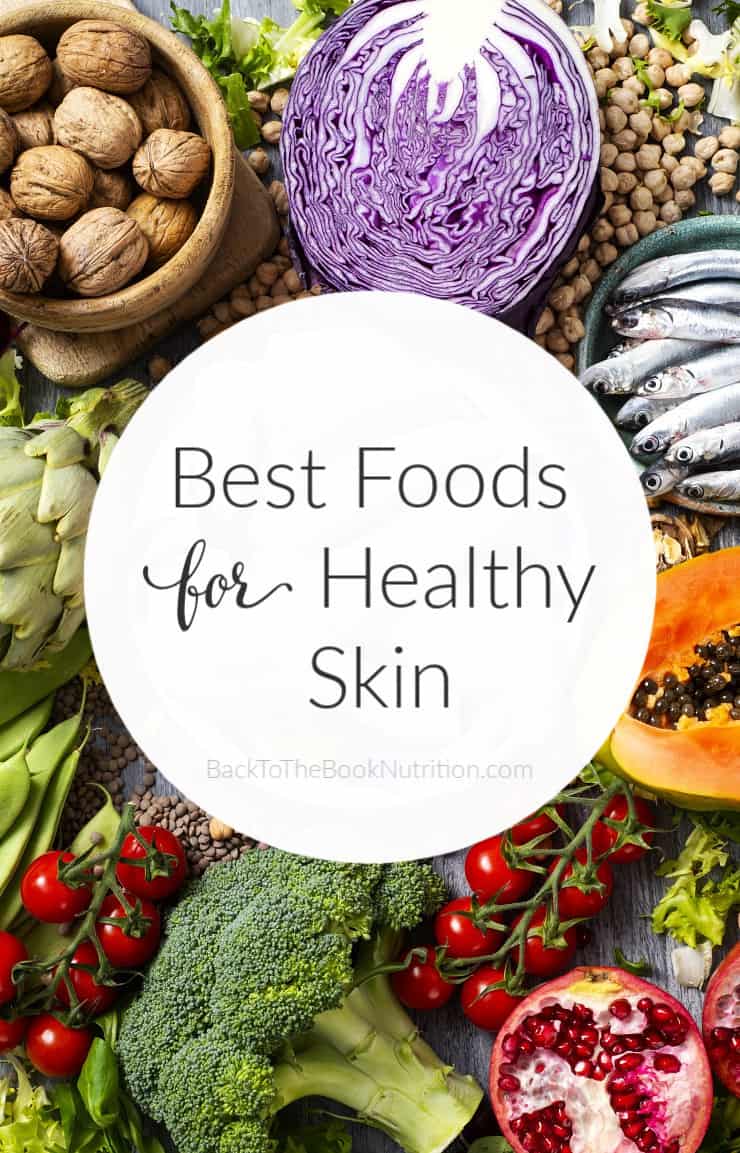
Note from Dena: This guest post was co-written with Rachel Orton, Dietetic Intern, as part of a research partnership between Back To The Book Nutrition and post-graduate nutrition students from Texas Woman’s University.
Over $100 billion dollars is spent annually on skin care products, most of it on face creams and lotions. (1) Topical skin products are great – especially if they’re nontoxic. But skin health starts on the inside.
Like every other major body organ, the health of our skin depends on our nutrition. Some foods and nutrients can give you healthier, more glowing skin, while others can promote acne, rashes, dry skin, and aging. So we’ve put together a list of eight nutrients (+ food sources) that can help your skin look and feel its best, plus a list of foods that could make skin issues worse.
Just remember, the skin has multiple layers and it can take several months for the skin to show the full effects of diet changes.
The Best Foods for Healthy Skin
1. Omega-3 Fatty Acids
How omega-3 fatty acids improve skin:
- Help decrease inflammation
- May improve inflammatory skin conditions, like acne, psoriasis, and eczema (2)
Food sources of omega-3’s:
- Fatty fish (wild salmon, mackerel, sardines, tuna, and anchovies, etc.)
- Flaxseed
- Chia seed
- Walnuts
Many of us don’t eat enough foods with omega-3’s. High quality fish oil supplements and cod liver oil can help increase intakes.
2. Vitamin A
How vitamin A helps skin:
- Improves growth of new skin cells and inhibits the sebaceous glands
- Deficiency can lead to scaly, dry skin
- Helps improve acne, eczema, psoriasis, and sunburns (3)
- Contains antioxidants called carotenoids that reduce free radical damage (4)
Food sources of carotenoids:
- Most red or orange fruits & vegetables and some green ones
- Tomatoes
- Watermelon
- Carrots
- Pumpkin
- Butternut squash
- Sweet potatoes
- Cantaloupe
- Tangerines
- Spinach
- Collard greens
Preformed vitamin A is the active form of the vitamin, meaning the body can absorb and use it easily.
Food sources of preformed vitamin A:
- Meat and organ meats from animals raised on pasture
- Wild caught fish
- Eggs from hens raised on pasture
- Dairy, including butter and cheese from animals raised on pasture
- Cod liver oil is a whole food supplement providing vitamin A
3. Vitamin C
How vitamin C helps skin:
- Most abundant antioxidant in the skin, helps reduce oxidative damage from external stressors
- Supports collagen production, helping the skin remain firm and elastic
- Anti-inflammatory for conditions like acne, rosacea, and depigmentation
Food sources of vitamin C:
- Bell peppers
- Guava
- Dark, leafy greens
- Kiwi
- Oranges, pineapples, and other citrus fruits
- Broccoli
- Strawberries and other berries
Vitamin C is heat sensitive, so it’s best to eat these foods raw or with minimal cooking when possible (3)
Note: This post contains affiliate links. By making purchases through these links, you pay the same amount for products, but a portion of the sale will be sent my way to help with blog expenses. Thanks!
4. Vitamin E
How vitamin E helps skin:
- Contains antioxidants called tocopherols that scavenge free radicals
- Topical application helps with sunburns and UV-related skin damage
- Deficiency can cause dryness, dandruff, and rashes
Food sources of vitamin E:
- Extra virgin olive oil
- Nuts (almonds, peanuts, hazelnuts)
- Sunflower seeds
- Tomato sauce
- Leafy greens (4)
5. Zinc
How zinc helps skin:
- Aids in wound healing and new cell growth involved in the structure of proteins and cell membranes
- Helps with immune function, anti-inflammatory
- Protects against UV light
- May reduce acne
- Increases vitamin A levels in the body
Food sources of zinc:
- Wild caught shellfish
- Liver and other organ meats from animals raised on pasture
- Red meat from animals raised on pasture
- Pumpkin seeds and nuts – zinc in plants foods is bound to phytates, making it harder to absorb, so rotate these with animal sources (3)
6. Probiotics
How probiotics help skin:
- Many skin problems start in the gut, probiotics can help balance bacterial growth
- Reduces inflammation and oxidative stress
- May improve acne, eczema, psoriasis, and dandruff
Food sources of probiotics:
- Fermented veggies (sauerkraut, pickles, fermented carrots, etc.)
- Cultured dairy (yogurt, kefir, etc.) – coconut milk yogurts and kefir are a good dairy-free alternative
- Avoid oversanitizing produce as this can remove beneficial soil-based (or spore forming) probiotic organisms.
- Walk barefoot, garden, etc., to increase your exposure to soil-based organisms
If you don’t consume food sources of probiotics daily, consider high quality probiotic supplements like Multi-Bio Max (lactobacillus/bifidobacter blend) and MegaSporeBiotic (spore forming probiotic blend). And don’t forget those prebiotic fibers to help feed the probiotics!
7. Collagen
How collagen helps skin:
- Collagen is the most abundant protein in the skin
- Consuming 1/2-2 Tbsp collagen per day improves skin hydration, elasticity, and aging (7)
- Just 1/2 Tbsp collagen daily improved the appearance of cellulite in women (8)
- Collagen may help prevent “leaky gut”, which is linked to a number of skin issues
- Aging reduces collagen formation, as do pollutants and toxins, causing wrinkles and skin aging, so collagen supplementation may be even more beneficial as we age
Food sources of collagen:
- Pasture-raised bone broth and organ meats are direct food sources of collagen. Get my easy homemade bone broth recipe, or look for Bonafide Provisions bone broth in the freezer section at your grocery store
- Hydrolyzed collagen peptides from grass-fed animals come in powdered form and can be added to coffee, hot tea, and smoothies (5)
- Eating more of the nutrients mentioned above, like vitamin C, help with collagen production and prevention of destruction
8. Flavanols
How flavanols help skin:
- Flavanols are natural plant compounds that act as antioxidants, repairing oxidative damage in the body
- One study found that approximately 2 tsp cocoa powder (320 mg flavanols) daily for six months significantly reduced wrinkles and increased skin elasticity in women (5)
Food sources of Flavanols:
- Tea
- Grapes
- Apples
- Raw cacao or cocoa powder
Worst Foods for Your Skin
If you’re motivated to improve your skin, you don’t just need to know what to eat – you also need to know what not to eat! It’s not to say that small amounts of these foods are bad for everyone but, if you’re struggling with skin symptoms, minimizing or omitting these for a time may be helpful.
1. Sugar
- Too much natural or processed sugar leads to advanced glycation end products (AGEs) that cause inflammation
- AGEs also attack collagen, resulting in wrinkles, loss of elasticity, and stiffness (6)
- Sugar also promotes gut imbalances and overgrowths that can lead to rashes, rosacea, and other skin symptoms
2. Dairy
- One of the most common food triggers of skin symptoms – Try eliminating dairy for at least a month to see if your skin begins to improve. If it does, consider extending this for several months.
- May influence skin redness and acne
- If you have poor gut health, you’re more likely to have an inflammatory reaction to allergenic components, like casein (milk protein)
3. Gluten
- Gluten rash (“Dermatitis herpetiformis”) is a telltale sign of Celiac Disease or gluten intolerance
- Eczema, hives, keratosis pilaris, and other skin problems have been linked to gluten. (9)
- Gluten exposure in those who are gluten sensitive can lead to leaky gut, which gives rise to other food sensitivities that can trigger skin reactions. (Learn 3 ways to test for gluten sensitivity here!)
4. Other Food Sensitivities
- Any food – even “healthy” foods – that your immune system reacts to can cause skin symptoms like itching, rashes, eczema, etc.
- Use food journaling to help identify whether certain foods may be linked to skin flares
- Try an elimination diet with careful reintroductions to determine specific food triggers
- Consider working with a practitioner to test for and address leaky gut as well as specific food, chemical, and environmental triggers that may be causing skin flares.
5. Excessive alcohol
- Drinking too much can lead to dehydration, which can promote dry skin and wrinkles
- Excessive drinking increases inflammation, which can damage the skin
Check out these other skin health posts!
Chocolate Protein Shake for Healthy Skin
Natural Tips for Healthy Skin: 11 steps to overcome root causes of chronic skin problems!
What Really Causes Rosacea and How to Overcome it Naturally
10 Ways to Overcome Acne Naturally

About the Co-Author: Rachel Orton’s love for nutrition developed through her own life story. She is pursuing a career in dietetics in an attempt to help educate others on the healing powers of food through her attained knowledge and personal testimony. Rachel is currently a Dietetic Intern and master’s student at Texas Woman’s University. Her B.S. in Nutrition Wellness was completed at Auburn University, alongside studies in Hunger. She later attended the University of Georgia for completion of the Didactic Program in Dietetics.
Disclaimer: Information on this site is intended only for informational purposes and is not a substitute for medical advice. Always consult with a trusted healthcare provider before implementing significant dietary change. Read additional disclaimer info here.
References:
- Skin Care Products Market Size, Share & Trends Analysis Report. (2019). https://www.grandviewresearch.com/industry-analysis/skin-care-products-market
- Kressner, C. (2019). Nutrition for Healthy Skin: Omega-3 Fatty Acids, Biotin, and Sulfur. https://chriskresser.com/nutrition-for-healthy-skin-part-2/
- Kressner, C. (2019). Nutrition for Healthy Skin: Vitamin A, Zinc, Vitamin C. https://chriskresser.com/nutrition-for-healthy-skin-part-1/
- Schagen SK, Zampeli VA, Makrantonaki E, Zouboulis CC. (2012). Discovering the link between nutrition and skin aging. Dermatoendocrinol;4(3):298-307. https://www.ncbi.nlm.nih.gov/pmc/articles/PMC3583891/
- Yoon, H-S., et al. (2016). Cocoa Flavanol Supplementation Influences Skin Conditions of Photo-Aged Women: A 24-Week Double-Blind, Randomized, Controlled Trial. The Journal of Nutrition;146(1):46-50. https://academic.oup.com/jn/article/146/1/46/4585665
- Gkogkolou, P., Bohm, M. (2012). Advanced glycation. Dermato-Endocrinology; 4(3): 259-270. https://doi.org/10.4161/derm.22028
- Choi, F.D., et al. (2019).Oral Collagen Supplementation: A Systematic Review of Dermatological Applications. J Drugs Dermatol; 18(1):9-16. https://www.ncbi.nlm.nih.gov/pubmed/30681787
- Schunk, M., et al.Dietary Supplementation with Specific Collagen Peptides Has a Body Mass Index-Dependent Beneficial Effect on Cellulite Morphology. J. Med Food. (2015). 18(12): 1340–1348. https://www.ncbi.nlm.nih.gov/pmc/articles/PMC4685482/
- Bonciolini, V., Bianchi, B., Del Bianco, E., Verdelli, A., & Caproni, M. (2015). Cutaneous Manifestations of Non-Celiac Gluten Sensitivity: Clinical Histological and Immunopathological Features. Nutrients, 7(9), 7798–7805. https://doi.org/10.3390/nu7095368

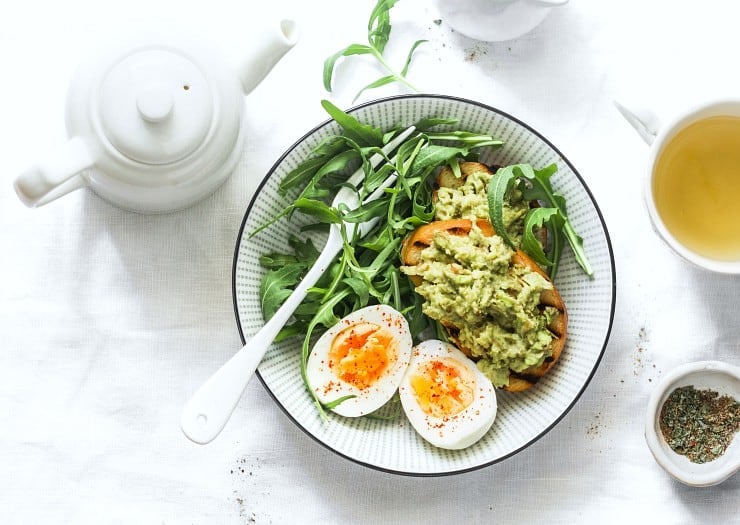

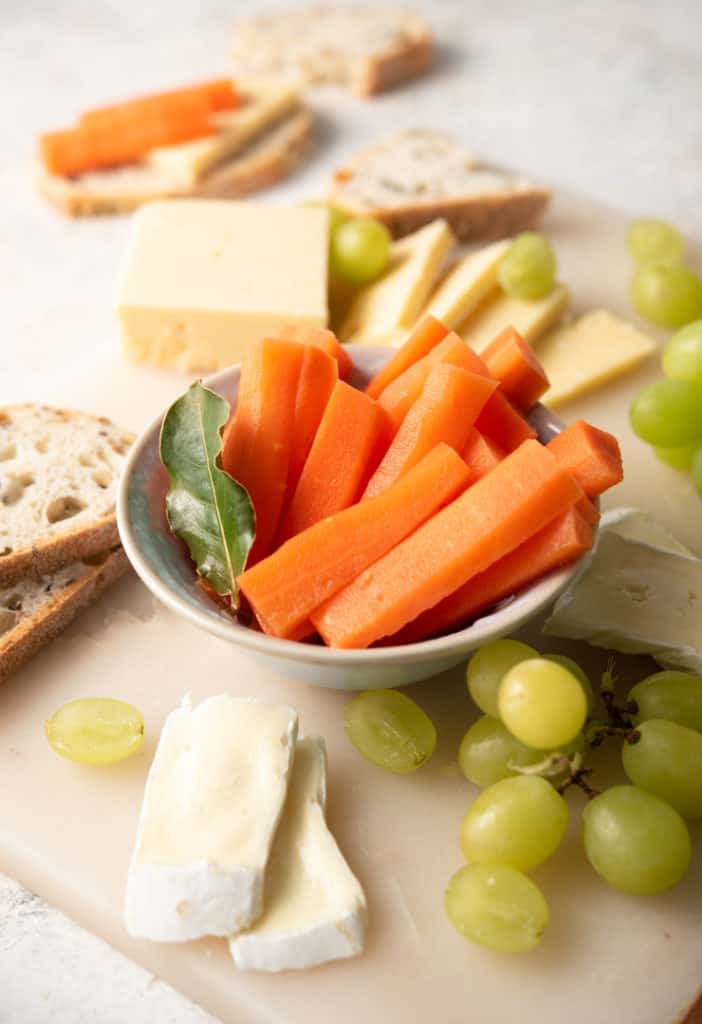
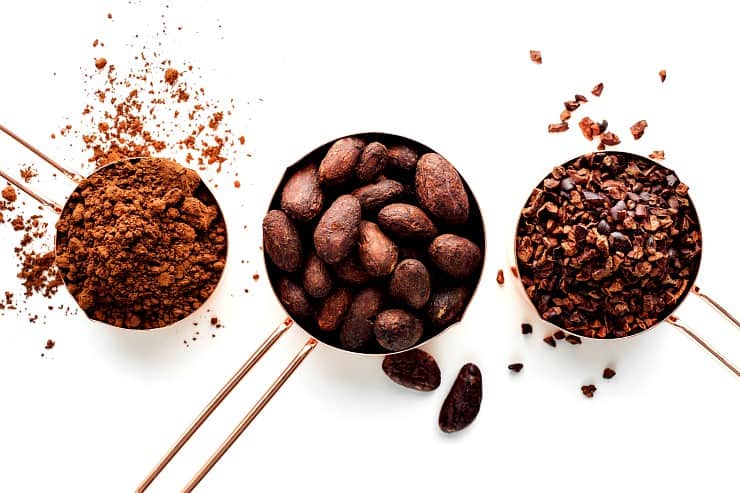
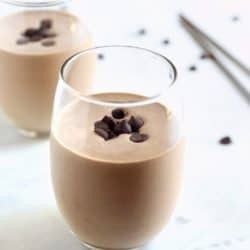

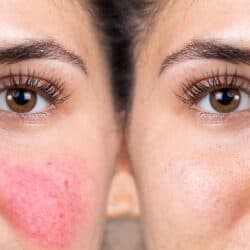

Eating the best foods for healthy skin, like those rich in antioxidants, vitamins, and healthy fats, is a fantastic way to nourish your skin from the inside out. For an extra boost to your skincare routine, consider visiting a medical spa in Placentia, where you can complement your diet with advanced treatments designed to enhance your skin’s health and radiance. It’s the perfect combination for glowing, youthful skin!
Thanks for sharing these nice tips on skin foods and how it can help for a healthy body, mind and skin. I would love to follow many of these tips.
Glad you like it Kaylan!
Oh I really love eating natural foods. It’s better if we get our nutrition in it rather than taking supplements. Love this information..
Glad you found it helpful Owen!
this is such an informative post, thank you for sharing this with us 🙂
I have learned lot from this! I will be taking more vegetables mentions here. I need to take care of my skin.
It seems like inflammation can cause a variety of the issues within the body, I didn’t realize it can take a toll on the skin as well.
I’ve become concious of my added sugar intake for this reason.
Thank you for the tips on what to eat, and what to avoid!
I can’t live or function without my Omega-3 acids! My skin health is absolutely vital for me and I’m always looking for ideas to improve. Love this list and thanks for sharing!
From,
https://themimiodyssey.com/
Omega-3s and other healthy fats are so important for skin health! Thanks for your comment, Miriam!
I love to read these kinds of articles. It’s important to know what benefits certain foods have for us.
Oh wow, so much useful information on this post. I am getting into selfcare and eating well. Thanks for this
Thanks Nelly! I hope you find it helpful.
I believe what you eat can have a big impact on your skin health. I’ve been taking Omega 3 to protect my immunity system. it reduce inflammation and keep skin moisturized. They’re also a good source of high-quality protein, vitamin E and zinc.